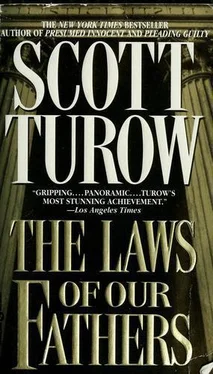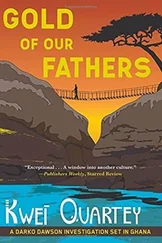Scott Turow - The Laws of our Fathers
Здесь есть возможность читать онлайн «Scott Turow - The Laws of our Fathers» весь текст электронной книги совершенно бесплатно (целиком полную версию без сокращений). В некоторых случаях можно слушать аудио, скачать через торрент в формате fb2 и присутствует краткое содержание. Жанр: Криминальный детектив, на английском языке. Описание произведения, (предисловие) а так же отзывы посетителей доступны на портале библиотеки ЛибКат.
- Название:The Laws of our Fathers
- Автор:
- Жанр:
- Год:неизвестен
- ISBN:нет данных
- Рейтинг книги:5 / 5. Голосов: 1
-
Избранное:Добавить в избранное
- Отзывы:
-
Ваша оценка:
- 100
- 1
- 2
- 3
- 4
- 5
The Laws of our Fathers: краткое содержание, описание и аннотация
Предлагаем к чтению аннотацию, описание, краткое содержание или предисловие (зависит от того, что написал сам автор книги «The Laws of our Fathers»). Если вы не нашли необходимую информацию о книге — напишите в комментариях, мы постараемся отыскать её.
The Laws of our Fathers — читать онлайн бесплатно полную книгу (весь текст) целиком
Ниже представлен текст книги, разбитый по страницам. Система сохранения места последней прочитанной страницы, позволяет с удобством читать онлайн бесплатно книгу «The Laws of our Fathers», без необходимости каждый раз заново искать на чём Вы остановились. Поставьте закладку, и сможете в любой момент перейти на страницу, на которой закончили чтение.
Интервал:
Закладка:
A few doors down, there is a wonderful greengrocery, Molin-ari's. In this season, Jocko has beautifully pyramided the citrus. Space heaters glow, running on extension cords right out here on the street. We each buy mountain water and a gorgeous Granny Smith apple.
'Jesus, look at me,' says Seth as we leave the store. His shirt is soaked through and even his sport coat is dampened in a semicircle beneath one arm. He'll have to return to the Hotel Gresham, he says, turn his jacket over to the concierge. We walk back toward the courthouse.
'You sound awfully heroic about everything,' he says. 'It's got to be tough. The divorce, the cancer. Single mom. You're pretty resolute.'
'The divorce,' I say, 'was a necessity. And Nikki is my joy. Being sick was terrible, but I think I've pretty much left it behind. Every six months or so, I have nightmares, and then there are a few hours when I'm back to scratch. But most days I'm – what did you say? Resolute? Resolved. Not heroic. What I'm gladdest of – proud of – is that I didn't become the disease. You know that starts in the hospital. They act as if you don't have a name. They identify you by the procedure. "You're a mastectomy." "You're a colostomy." It's so easy to think that this illness that's threatening your life is your life. And I got past that. I had my baby. I took this job. Eventually, you say it happened,' she says. 'Bad things happen. Cancer or divorce. They happen. You know?' I mean it, I believe it. And yet the stress of these cataclysms still rebounds. I must have learned more about myself later than most human beings. The last dozen years, the point when my friends from college seemed to have a collection of habits and chosen reflexes they called a life – for me the same period has been like a bombing run, one explosive surprise after another. Getting sick. Getting back together with Charlie. Finishing law school. A baby. Divorce. The bench. When? I wonder, considering it all, when, when will I come to rest, be in a place of comfort, or at least repose?
'Bad things happen,' Seth repeats, and I recognize only now what was contained in his observation about being resolute. I feel unconscionably dull, even though my aching for him continues to engird me, as if my rib cage had been irradiated.
'It takes a long time, Seth.'
'People say.' He catches my eye. He's heard it all. I begin to apologize, but he interrupts. 'I wasn't going to mention it,' he says. ‘I really hate -'
'Oh, Seth. I just -' It would break my heart to think that any old friend, any person who had so much of my life might isolate himself with something like this. And what is it that looms up so large? Life, I'd say. To my amazement, I find, although I'm not a teary person by nature, that I am suddenly crying. He briefly throws an arm around me and I dry my nose on the sweatshirt sleeve from which various threads are hanging. Blessedly for both of us, we are behind the courthouse again, where we started.
'So you got your exercise,' he says for lack of anything else. I can only smile. 'Do you ever bring Nikki down here? I'd love to see her.'
It's an innocent request, but like all else at the moment, it knocks my heart around, thinking about what the sight of friends' kids must be to him, both the torment and the reassurance.
'Come by sometime. When you visit your father. It's 338 Grove.'
'It would make the trip worthwhile. Almost,' he says. He looks at me. 'You better think about it.'
'It'll be okay. You're on good behavior and so am I.' 'Maybe this weekend?' 'We're in and out both days.' 'Whenever.'
I hug him quickly. Half a foot shorter than he is, I face him. I know now I was right when he initially stood up in the courtroom and I thought I detected depletion of some kind. Wreckage. Pain. At the Judge's Entrance, I leave him with a slogan of our foregone times.
'You're a good man, Charlie Brown.'
APRIL 1970
Seth
Eddgar's expulsion hearings before the university Senate commenced in the third week of April. Sessions ran from 4:00 in the afternoon to 10:00 at night, so faculty members could attend without interrupting their classes. After each evening's adjournment, the Eddgars and their lawyers met for a lengthy planning session, arguing about strategy, gathering information about coming witnesses. Eddgar and June seldom arrived home before 2:00 or 3:00 in the morning, only a couple of hours before I had to get up to begin distributing After Dark to the coin boxes. As a result, I began putting Nile to bed on the living-room sofa in my apartment. Roiled up by my imminent flight to Canada and my breakup with Sonny, I was not sleeping soundly and usually heard one of his parents steal in to retrieve him.
My life in those weeks felt dismal, stillborn, lost. I could not figure out why I had gone on working, why I had not left yet, except that it didn't seem I could take any substantial step in such a shattered state. My induction remained a couple of weeks off, on May 4. Michael, Nile, and I continued to eat dinner each night, but they were sorry gatherings, silent except for the TV which Nile watched. I felt Sonny's absence acutely, and Michael, even for Michael, was remote. He claimed his lab was preoccupying him, but I sensed his affair with June had moved to a critical new stage. Those days each of them seemed tense in the other's presence.
After Nile was asleep, I would lie on the mattress on our bedroom floor – where I now slept alone – my transistor clutched to my ear as I listened to the hearing sessions being broadcast on campus radio at Eddgar's demand. It reminded me of when I was seven or eight and used to lie beneath the blankets at home with the volume on my radio reduced to a secretive hush, listening to the Trappers' baseball games in what I now unexpectedly regarded as happier times.
The case against Eddgar depended principally on evidence gathered by the campus police. For all the talk of snitches, none had come forward. Nor did they appear to be needed. The cops had photographs. They showed the PLP members in their gas masks. And in the picture that became more or less the signature of the case, the mystery woman, the girl who'd shrieked and disappeared, was portrayed emerging from the crowd. One moment, she was unmarked. Then her hand was at her face. Streaks of dark blood were shown running from her crown, but, said the faculty prosecutor, something was dropping from her hand. A vial? She was identified from mug shots as Laura Lancey, an employee at Bayside Packers, the canning plant where June worked. As Eddgar's lawyers pointed out, none of this proved she was not beaten; none of this implicated Eddgar, even if it was assumed that Eddgar was acquainted with the young woman, which he emphatically denied. But the sequence of photos – the university produced the numbered contact sheets – showed Eddgar looking twice across his right shoulder, behind himself to the area of the broad pea-gravel plaza where Laura Lancey eventually emerged. As if he knew something was going to happen there. Eddgar's lawyers claimed the negatives had been reversed.
In the cafe discussions on Campus Boul, there were few testimonials to Eddgar's character. No one supposed he was above violence or lying about it afterwards. He was, after all, a revolutionary, dedicated to undermining bourgeois institutions. But if the university was held to the standards of the system it wanted to defend, its evidence seemed flimsy. Eddgar's speech was just that, a speech. The faculty prosecutor tried to establish that Eddgar had been on campus, aiding the rioters. Two cops claimed they had glimpsed Eddgar, supposedly helping the fellow who tumbled from the police-station roof, but they admitted being several hundred feet away at the time. The police had also retrieved a shirt from a trash container on campus. It had a One Hundred Flowers armband tied on one sleeve and the pointillistic remnants of what the prosecutor claimed were Eddgar's initials printed in the collar years before when he still sent his shirts to the Chinese laundry. The ironies of this bit of evidence were not lost on anyone.
Читать дальшеИнтервал:
Закладка:
Похожие книги на «The Laws of our Fathers»
Представляем Вашему вниманию похожие книги на «The Laws of our Fathers» списком для выбора. Мы отобрали схожую по названию и смыслу литературу в надежде предоставить читателям больше вариантов отыскать новые, интересные, ещё непрочитанные произведения.
Обсуждение, отзывы о книге «The Laws of our Fathers» и просто собственные мнения читателей. Оставьте ваши комментарии, напишите, что Вы думаете о произведении, его смысле или главных героях. Укажите что конкретно понравилось, а что нет, и почему Вы так считаете.












